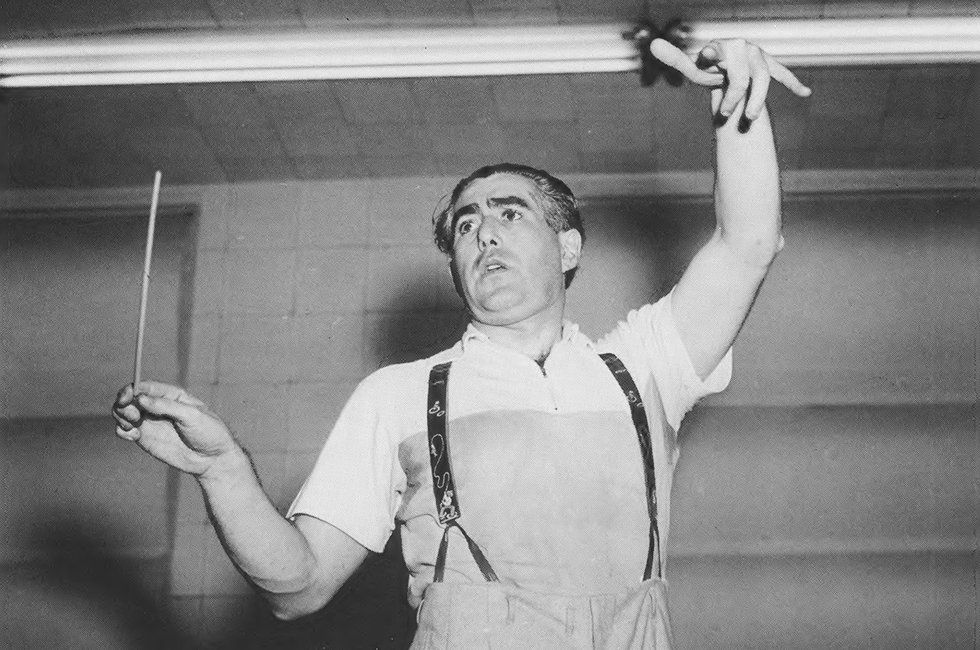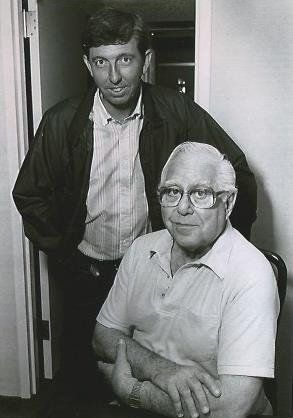Albert Glasser conducting his score for HUK! At the Samuel Goldwyn Studio Sound-Stage
Below: David L. Fuller shown with film composer Albert Glasser (seated) in 1986
Originally published at Film Music Review,
with
permission of the editor Roger Hall
David, some soundtrack fans are aware of your earlier albums, such as HUK! (1956) and TOKYO FILE 212 (1951) both by Albert Glasser. Please tell our readers how you got started with producing film music record albums.
I’ll try to be brief but quite a lot happened at the beginning. First off, I did not start with Al Glasser and HUK! I originally, believe it or not, intended to do a production of THE DAY THE EARTH STOOD STILL. I had spoken to Len Engle at 20th Century Fox and he had assured me that music existed and was in great shape, so I engaged the services of Leslie Zador, a music attorney, to handle the negotiations with Fox. He is, by the way, the son of Eugene Zador who was Miklos Rozsa’s orchestrator. This was in 1984, and at this time, in order to release a film soundtrack from original masters, the musicians who had performed the music had to be paid a re-use fee via the union. So the process started with determining how much this would be, and in the meantime, Fox sent me the original cue sheets for the film.
And did you consult with anyone else about working on THE DAY THE EARTH STOOD STILL?
While I was waiting for the information on the fee, I spoke to John Corigliano about doing a musical essay on the score – to be included with the album. He liked the idea, but had to bow out as he had just taken on the commission to score his second film, REVOLUTION. I then spoke to Fred Steiner who agreed to if and when the negotiations with Fox were finalized. The same for director, Robert Wise, who agreed to an interview following the finalization of a deal.
I know that Robert Wise was one of the featured speakers on the DVD of that film. The soundtrack was eventually released in 1993 on the Fox Records label, and recently the soundtrack was reissued in with additional music from Kritzerland, which I chose for a Best Release of 2014. So what happened with your Fox deal?
The word came back – the union required $39,000! Well, I had quite a bit of money but not that much. Being new to this whole process and, basically an honest person, I had to admit that I did not have enough.
What happened next?
Then John Caps, whom I had known for many years, and who was a talented music writer, put me on to David Shire, who was looking for someone to produce an audio-file LP of his music from RETURN TO OZ, and this time I had enough money since Disney was fronting a large part of the musicians fee. So Shire agreed but because of a silly snafu, which I won’t detail now, he pulled out of the project.
What happened next? Did you contact any other film composers?
I had spoken to Al Glasser in 1980 by phone on a couple of occasions, and he was awful nice and friendly, and he had copies of all his music, so I called him up, told him what I wanted to do – he was skeptical at first – and convinced him that I was serious.
I’m aware of Al Glasser especially for the ’50s B-movies like THE BUSHWACKERS western and the Bert I. Gordon films, like THE AMAZING COLOSSAL MAN. Also, he wrote radio themes, especially the one for Hopalong Cassidy. And he also wrote the music for THE CISCO KID, both the films in the 1940s and the TV series in the 1950s with Duncan Renaldo as Cisco. Thanks to you, I also learned that he also composed some classical pieces, like
Concerto for String Bass and Symphony Orchestra, which was performed in Bellflower, California in 1977. How did you meet with Glasser?
He came to Dallas with his lovely wife, Shirley, bringing his master tapes to HUK! He came on Saturday, we spent the weekend getting acquainted, and on Monday, we had a master tape made for the record at a studio in Dallas. We had the music, next the album presentation.
What other work did you do for the HUK! album?
I wanted to do some background on the film, so that people would know something about why the music was as it was. I’d only seen HUK! many years before as a teenager, so I called the movie critic at the local newspaper and asked his assistance in getting some background on it. When he heard what we were doing, he wrote a whole review, and even had a private viewing at a local TV station. That took care of the film portion.
Was there any further information gathered from Al Glasser?
John Caps agreed to write about the music and interviewed Al by telephone, and Al gave me a copy of his autobiography, “I DID IT!”, so we included the part which recalled HUK! in the album as well. We couldn’t find a local printer who could handle the gate-fold jacket, so we had to have it printed and fabricated in California by Stoughton Printing. So, there it is – the creation of a label… The Screen Archives Collection
What other soundtracks did you work on after that initial album?
We followed HUK! with TOKYO FILE 212 (1951) and the Sawtell / Shefter KRONOS as LPs, then the CDs. I followed the LPs with the deluxe CD production of THE BIG COUNTRY, and its follow-up THE PROUD REBEL, both by Jerome Moross, and produced with the cooperation of the composer’s daughter, Susanna Tarjan. Then the three Jerry Fielding CDs: THE WILD BUNCH, THE OUTLAW JOSEY WALES, and THE KILLER ELITE, all with the assistance of Nick Redman and the cooperation of the Fielding Family. And, finally two Gerald Fried CDs, THE MYSTIC WARRIOR and TOO LATE THE HERO, before health and other issues took me from the scene.
What kind of response did you receive for the soundtrack albums?
Maybe my stuff is a bit showy, but I think that these composers and their music deserve the deluxe treatment, and that’s what I try to give them. Al [Glasser] was really pleased, and I later heard that he tried to sell copies to anyone he happened to meet. I also heard that George Montgomery at one of those collectors conventions signing autographs, was asked to autograph the HUK! album, and exclaimed, “Holy Cow!” when he saw it.
I understand you have been working on music by other film composers, such as Jerry Fielding (BELOW THE BELT), Paul Sawtell (THE DESPARADOS ARE IN TOWN) and especially Gerald Fried. Are there others?
Ralph Ferraro had one of the most interesting careers in music.
Yes, I see that in addition to being a composer (SHE BEAST, 1966), he was also an arranger (FLESH GORDON, 1974) and an orchestrator (STAR TREK VI: THE VOYAGE HOME, 1986).
He was truly a gifted musician and a wonderful person. I am, perhaps, more proud of the friendship I shared with Ralph (by long distance) than any other experience of my life. He was the most genuine human being I have ever known.
Thank you, David, for sharing your comments about your record albums and friendship with film composers. I think film music fans should appreciate what you have done to keep this music alive. We need more people like you.
This interview took place in March 2015 - In Memory of David L Fuller (1947-2017) - To read his
obituary





